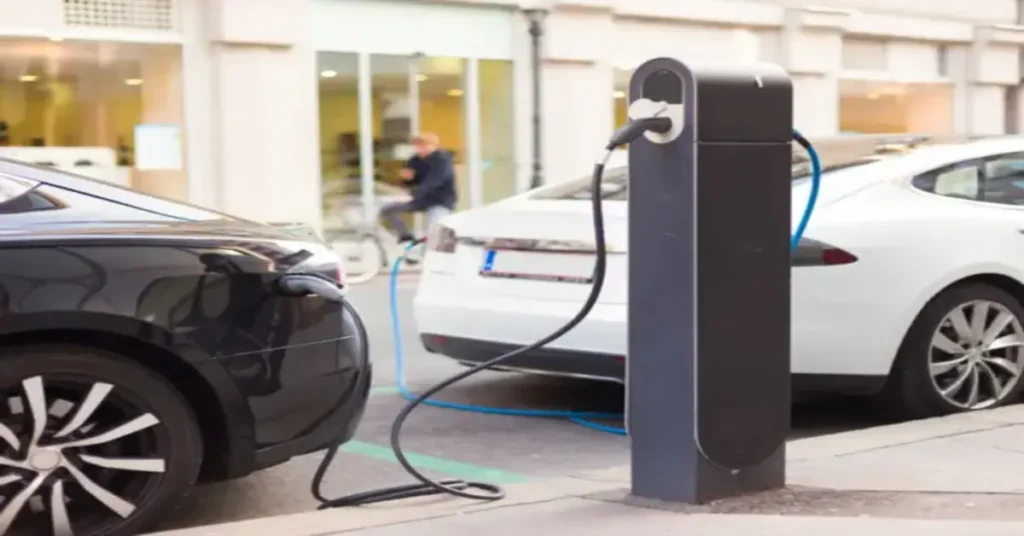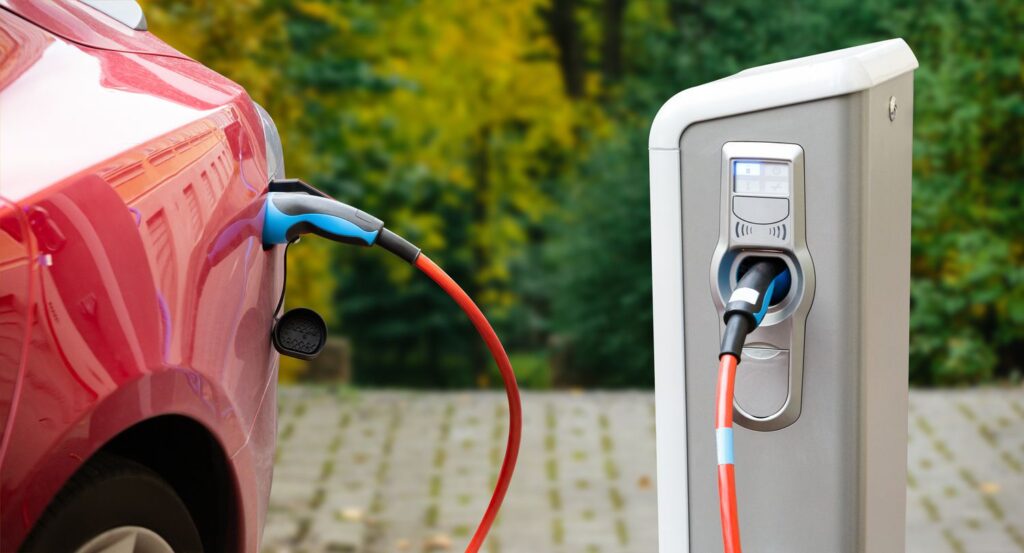
As electric vehicles (EVs) become more common on our roads, numerous people are interested in understanding the cost of charging an EV. The average cost to charge an electric car varies depending on several factors, including electricity rates, the size of the car’s battery, the type of charging station used, and the weather conditions in which the car is being charged. In this guide, we will give you an ultimate and complete guide to understanding the average cost to charge an electric car in 2023. What is the average cost to charge an electric car ?
On average, it can cost between £0.14/ kWh in the UK, $0.13/ kWh in the US, and AUD0.29/ kWh in Australia to charge an electric auto. Home charging is usually more affordable than using public charging stations. Climate control settings, similar to air exertion or heating, can impact the car’s range and charging cost. Still, electric cars are generally cheaper to fuel than gasoline cars, and electric vehicle owners can save thousands of dollars in fuel costs over the life of the vehicle. The average cost to charge an electric car depends on a variety of factors, including the price of electricity in your area, the size of the car’s battery, and the type of charger used.
Average Cost to Charge Electric Car by Country
| Country | Average Cost to Charge Electric Car |
| UK | £0.14/kWh |
| USA | $0.13/kWh |
| Australia | AUD 0.29/kWh |
Average Cost to Charge an EV

The cost of charging an EV can vary depending on several factors, including where you live, the type of EV you have, and how frequently you drive.
In this composition, we will give a comprehensive guide to the average cost to charge an EV, including tips for reducing costs, comparisons to gasoline vehicles, and data from various countries around the world.
Factors Affecting the Average Cost to Charge Electric Car

The average cost to charge an electric car is influenced by several factors, including the cost of electricity in your area, the size of the car’s battery, the charging system you use, and the climate control settings you prefer and the cost of charging an electric vehicle may vary by country or region. In this section, we will explore these factors in further detail and their impact on the average cost to charge an electric car.
The average cost to charge an electric car can vary depending on a range of factors, including:
1. Electricity rates: The cost of electricity varies from region to region and can have a significant impact on the cost to charge an electric car. In general, areas with higher electricity rates will have higher charging costs.
2. Charging speed: The charging speed of an electric car can affect the cost to charge it. Faster charging rates generally come with higher costs.
3. Battery size: The size of the battery in an electric car will affect the cost to charge it. Larger batteries will require more electricity to fully charge and will therefore have a higher charging cost.
4. Climate conditions: The use of climate control systems like air conditioning and heating can significantly impact the range of an electric car and its charging cost.
5. Time-of-use tariffs: Some utilities offer time-of-use tariffs, which charge different rates for electricity depending on the time of day. Charging an electric car during off-peak hours can reduce the cost of charging.
6. Charging location: The cost of charging an electric car can also vary depending on where it is charged. Charging at home is generally cheaper than charging at public charging stations or fast charging stations.
7. Type of EV: Different electric vehicles have different charging requirements, and this can impact the cost of charging. For example, Tesla have a higher charging capacity, which means they can charge faster, but this can also come with a higher charging cost.
8. Vehicle efficiency: The efficiency of an electric vehicle can also impact the cost to charge it. More efficient vehicles require less electricity to travel the same distance and will therefore have a lower charging cost.
9. State and federal incentives: Some states and the federal government offer incentives to electric vehicle owners that can reduce the cost of charging. These incentives can include tax credits, rebates, or grants.
10. Charging equipment: The type of charging equipment used can also affect the cost to charge an electric car. Level 1 charging, which uses a standard 120-volt household outlet, is slower and less expensive than Level 2 charging, which requires a dedicated 240-volt circuit.
11. Battery age and condition: The age and condition of the battery in an electric car can affect its charging efficiency and therefore its charging cost.
12. Charging habits: The charging habits of the electric car owner can also affect the cost to charge. Overcharging, charging to 100%, or charging during peak hours can increase the cost to charge an electric car.
“Charging an electric vehicle can cost significantly less than filling up a gasoline vehicle. On average , it can cost less than half as much.” – U.S. Department of Energy
Cost Comparison of EV Charging at Home and Public Charging Stations

| Charging Method | Average Cost per kWh | Average Cost for a Full Charge |
| Home Charging | £0.14/kWh | £6.72 (for a 48 kWh battery) |
| Public Charging | £0.30/kWh | £14.40 (for a 48 kWh battery) |
To calculate the cost of charging your EV, you need to know how important electricity it uses per hour. Once you know the electricity usage, you can multiply it by the electricity rate in your area to get the cost per hour of charging. For example, if your EV uses 4 kWh of electricity per hour and the electricity rate in your area is £0.14 per kWh, also the cost of charging your EV would be £0.56 per hour.
The Cost of Charging a Tesla
Tesla is one of the most popular EV brands on the list. The cost of charging a Tesla varies depending on the model and the charging system used. For example, the Tesla Model 3 has a range of about 263 miles on a single charge and requires about 50 kWh of electricity to completely charge its battery. At an average cost of £0.14 per kWh, it would bring about£ 7 to completely charge a Tesla Model 3.
Strategies for Minimizing the Average Cost to Charge Electric Car

While the cost of charging an EV is generally lower than the cost of fueling a gasoline car, there are still ways to reduce your average cost to charge an electric car even further. In this section, we’ll go through some strategies for minimizing the average cost to charge an electric car.
1. Take advantage of off-peak electricity rates: Many utilities offer lower rates during off-peak hours, such as overnight or on weekends. By charging your EV during these times, you can reduce your average cost to charge an electric car.
2. Use a home charging system: Charging your EV at home is generally cheaper than using public charging stations, as you can take advantage of your home’s electricity rates. Additionally, installing a Level 2 charger can speed up your charging time and reduce your overall charging costs.
3. Plan your trips and charging stops: By planning your trips and charging stops in advance, you can avoid unnecessary charging sessions and reduce your charging costs. This can also help you avoid peak demand times when charging rates may be higher.
4. Use range mode and climate control wisely: Range mode and climate control settings can impact your EV’s range and charging costs. Using range mode can conserve battery power and increase your range while using climate control sparingly can also reduce your charging costs.
5. Use public charging stations strategically: Public charging stations are often more expensive than home charging, but they can be a convenient option for longer trips or when you don’t have access to a home charger. By using charging station apps to find the most affordable and convenient stations, you can minimize your charging costs.
6. Take advantage of incentives and rebates: Many governments, utilities, and automakers offer incentives and rebates for EV owners. These can include tax credits, grants, and discounts on charging equipment. By taking advantage of these programs, EV owners can further reduce their charging costs and the overall cost of EV ownership.
7. Choose an EV with a larger battery capacity: EVs with larger battery capacities can travel further on a single charge, reducing the need for frequent charging stops and lowering overall charging costs. However, larger batteries may also come with a higher purchase price, so it’s important to consider the tradeoffs and determine the best option for your needs.
8. Consider joining an EV car-sharing program: EV car-sharing programs allow members to access EVs on a shared basis, reducing the need for individual ownership and associated charging costs. Additionally, many programs offer discounts on charging fees and other incentives.
9. Monitor your charging habits: By tracking your charging habits and costs, you can identify areas where you can improve your efficiency and reduce your costs. For example, you may find that certain charging stations or times of day are more expensive than others, or that your driving habits impact your charging needs.
10. Opt for renewable energy sources: By using renewable energy sources, such as solar or wind power, to charge your EV, you can reduce your environmental impact and potentially lower your charging costs. Additionally, some utilities offer programs that allow EV owners to purchase renewable energy credits or participate in community solar programs.
“While Charging an electric vehicle can be more expensive than charging a smartphone, it still significantly cheaper than filling up a gasoline car. electric car can save driver thousand of dollars in fuel costs over the life of the vehicle.”
– Edmunds
How Range Mode Can Reduce the Average Cost of Charge Electric Car?

One of the biggest concerns for those considering an EV is the issue of range anxiety or the fear of running out of charge before reaching their destination. So, we will know how Range Mode works and how it can help you save money on EV charging costs.
Range mode is a feature available on some electric vehicles (EVs) that can help reduce the average cost to charge an electric car. When activated, this mode limits the vehicle’s power and speed to increase its range. By reducing the vehicle’s power output and speed, the range mode can help extend the car’s battery life and decrease the frequency and duration of charging sessions.
Impact of Climate Control on EV Range and Charging Cost
| Climate Control Setting | Range Loss | Charging Cost Increase |
| Off | 0% | 0% |
| Eco Mode | 10-20% | 0% |
| Comfort Mode | 20-30% | 5-10% |
| Max A/C or Heating | 40-50% | 10-20% |
Additionally, some EVs equipped with range mode can adjust climate control settings to optimize energy effectiveness. By reducing the use of heating or air exertion, EVs can extend their range and reduce the need for charging.
Comparing the Average Cost to Charge Electric Cars with Gasoline Cost for ICE Vehicles
| Vehicle Type | Average Cost per Mile (in the UK) | Average Cost per Mile (in the USA) | Average Cost per Mile (in Australia) |
| Electric Car | £0.04 | $0.04 | AUD 0.10 |
| Gasoline Car | £0.13 | $0.15 | AUD 0.15 |
As the world shifts towards cleaner and further sustainable modes of transportation, the cost of charging an electric car has become an important factor to consider. One of the most significant advantages of electric cars over gasoline-powered vehicles is the lower cost of energy. Still, numerous people are not apprehensive of the significant cost savings that come with retaining an electric car.
The average cost per mile for an EV is around £0.04, while the cost per mile for a gasoline car is around £0.13. also, in the USA, the average cost per mile for an EV is around $0.04, while the cost per afar for a gasoline car is around $0.15. In Australia, the average cost per mile for an EV is around AUD 0.10, while the cost per mile for a gasoline car is also around AUD 0.15.
Also, EVs are generally more effective than ICE vehicles, which means they can travel further on the same amount of energy. According to the US Department of Energy, an EV can travel roughly 3- 4 miles on the same amount of energy that it takes to produce one gallon of gasoline.
Of course, the factual cost of charging an EV will depend on a variety of factors, including the cost of electricity in your area, the size of your battery, and your driving habits. Still, in general, the cost of charging an EV is significantly lower than the cost of fueling a gasoline car, and EV drivers can save thousands of dollars in fuel costs over the life of their vehicle.
Conclusion
Conclusion 1: The Average Cost to Charge an Electric Car
In conclusion, the average cost to charge an electric car can vary greatly depending on several factors, such as the country, charging system, climate conditions, battery size, and electricity rates. In general, electric cars are cheaper to fuel than gasoline cars and the cost of charging an EV is significantly lower than the cost of filling up a gas tank. By understanding the different charging options and strategies for minimizing the cost of charging, electric car owners can take advantage of the numerous fiscal benefits that electric cars offer. Also, with the added availability of public charging stations and the ongoing development of new technologies, charging an electric car has become more accessible and affordable than ever before.
Conclusion 2: Public Charging Stations more Expensive
Public charging stations are generally more expensive than home charging, but they are convenient for long trips or when you don’t have access to a home charging station.
Frequently Asked Questions
How long does it take to charge an electric car?
The time it takes to charge an electric car depends on the battery capacity and the charging speed. Charging times can range from 30 minutes for a fast charge to several hours for a full charge using a standard wall socket.
Are public charging stations more expensive than home charging?
Public charging stations are generally more expensive than home charging, but they are convenient for long trips or when you don’t have access to a home charging station.
Can extreme temperatures affect the cost of charging an EV?
Extreme temperatures can affect the cost of charging an EV as using climate control can reduce your EV range and increase charging costs.
Are there any government incentives for EV charging equipment?
In some countries, including the UK and the US, the government offers grants and tax credits for home EV charging equipment to encourage electric vehicle adoption.
How can I find charging stations near me?
You can use apps like Plug Share or Charge Point to locate charging stations near you. These apps also provide information on the cost of charging and the type of charging station available.
Related Posts
- Tesla rattle when accelerating – complete guide
- What Is The Lifespan Of An Electric Car?
- Electric Car Law in the United Kingdom – An Ultimate guide 2024
- Tesla Model 3 SR Range
- What Is the Weight Of a Tesla Model S battery? What about in terms of volume?
- Amazing Electric Car Without Battery that will blow your mind
- Review Of Impact Of Electric Car Charging Station On The Power Grid USA – 2024 Guide
- Technology To Manage Range Anxiety In Electric Cars
- Why Do UK Owner Pay Road Tax who Drive Electric Cars?-An ultimate guide 2024
- (2022-24) Cost of charging an electric car battery in various cities of the United Kingdom – Comprehensive Data- A complete guide 2024
- Electric Car Range Per Dollar
- What is The Advantage of Using Many Small Batteries Over Large Battery to Power an Electric Car?
- Location Of an Electric Car Battery
- Tesla Model X Battery Heater Replacement – Complete Guide 2024
